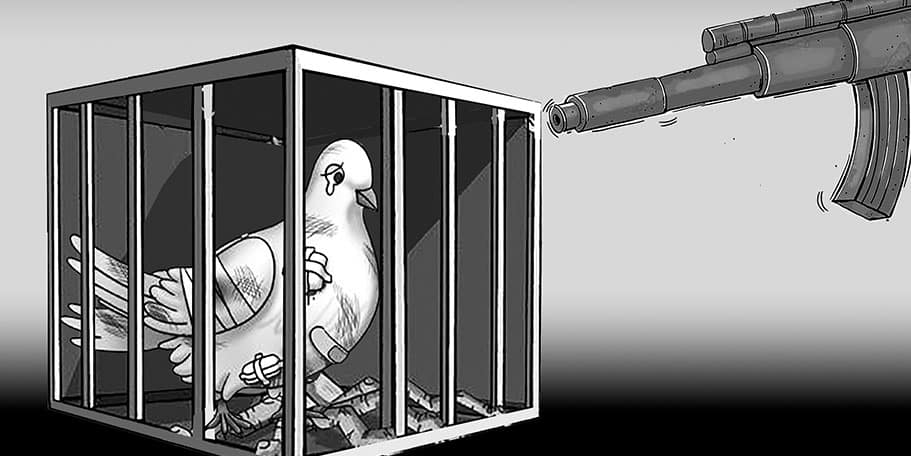
Ethiopia’s government frequently touts its achievements in ensuring the prevalence of peace and security in the country. In what has become par for the course the Commissioner of the Ethiopian Federal Police (EFP) told journalists this week that in coordination with national defence forces and other security agencies EFP is doing a stellar job of protecting the peace and security of the nation. Yet, beneath this projection of stability, Ethiopia remains trapped in a cycle of conflict, repression, and systemic governance failures. From the Amhara to the Oromia regions, unresolved grievances, inter-communal conflicts, and state-sponsored abuses continue to fuel instability. Rather than perpetuating a misleading narrative of progress, the Ethiopian government must confront the root causes of its crises—political exclusion, economic marginalization, and a militarized approach to quell dissent—before the country descends into chaos.
The Ethiopian government’s insistence on portraying the country as stable stands in stark contrast to the reality on the ground. While the 2022 Pretoria Agreement halted the two-year brutal war in Tigray, it did not address the underlying drivers of conflict. Meanwhile, the government’s heavy-handed response to dissent in Amhara—triggered by its decision to disband regional special forces—has reignited violence, with the state-appointed Ethiopian Human Rights Commission as well as other local and international human rights bodies documenting drone strikes, mass arrests, and extrajudicial killings on a regular basis. Government forces have employed similar tactics to quash the insurgency being waged by the Oromo Liberation Army (OLA) in large swathes of the Oromia region, while the OLA has retaliated with targeted violence. These conflicts are not isolated; they are symptoms of a deeper malaise—a state that prioritizes coercion over dialogue and superficial stability over genuine reconciliation.
Prime Minister Abiy Ahmed’s administration has consistently defaulted to militarized solutions, even as these tactics exacerbate instability. Its reliance on internet shutdowns, arbitrary detentions, and extrajudicial force has only deepened public distrust. In Amhara, the declaration of a state of emergency in 2023 granted security forces sweeping powers to arrest critics, suspend due process, and suppress protests. Journalists and human rights defenders documenting abuses face harassment, imprisonment, or forced exile, further eroding any pretense of democratic governance. This securitized approach is not only morally indefensible, but also strategically flawed. Military force alone cannot resolve the root causes underpinning the conflicts ravaging Ethiopia: historic grievances, disenfranchisement, and fundamental differences over the distribution of power and the structure of the state; it can only postpone—and intensify—future eruptions of violence.
When the premiere assumed office in 2018, his rhetoric of unity and reform inspired hope. Yet, his administration has since mirrored the autocratic tendencies of its predecessors. The ruling Prosperity Party’s consolidation of power has sidelined opposition voices, while promised reforms—such as transitional justice and national dialogue—have been undermined by a lack of political will and the perceived absence of genuine inclusivity. The government’s transitional justice policy, which it adopted in 2024, has been criticized for excluding international oversight and failing to address Eritrea’s role in atrocities. Without credible accountability, victims of war crimes in Tigray, Amhara, and Oromia are likely to have little reason to trust the state.
The path forward requires a shift from rhetoric to action. If Ethiopia is to avoid the specter of fragmentation, the government must abandon its habit of self-congratulation and take concrete steps to address the roots of its crises. First and foremost it must set in motion a process that helps attain long-term political solutions. In this regard it is incumbent on it to engage in good-faith negotiations with armed groups like the OLA and Fano as well as marginalized political factions. The Pretoria Agreement’s elite bargaining model failed to include civil society or address broader grievances; future processes must be more representative. This should be complimented by demilitarization and measures intended to uphold accountability for those implicated in gross human rights violations. Moreover, it is of the essence to end the crackdown on journalists and activists with a view to rebuild public trust. The government must abandon its ingrained habit of brooking no dissent and allow independent scrutiny of its actions.
Ethiopia’s government can no longer afford to mask its failures with empty proclamations of peace. The country’s stability hinges on addressing the exclusion, impunity, and repression that drive its conflicts. Without urgent action, Ethiopia risks being eternally mired in mayhem and destruction—a tragedy for its people and a crisis for the Horn of Africa. The time for honest reckoning is now.
.
.
.
#Time #Honest #Reckoning
Source link











